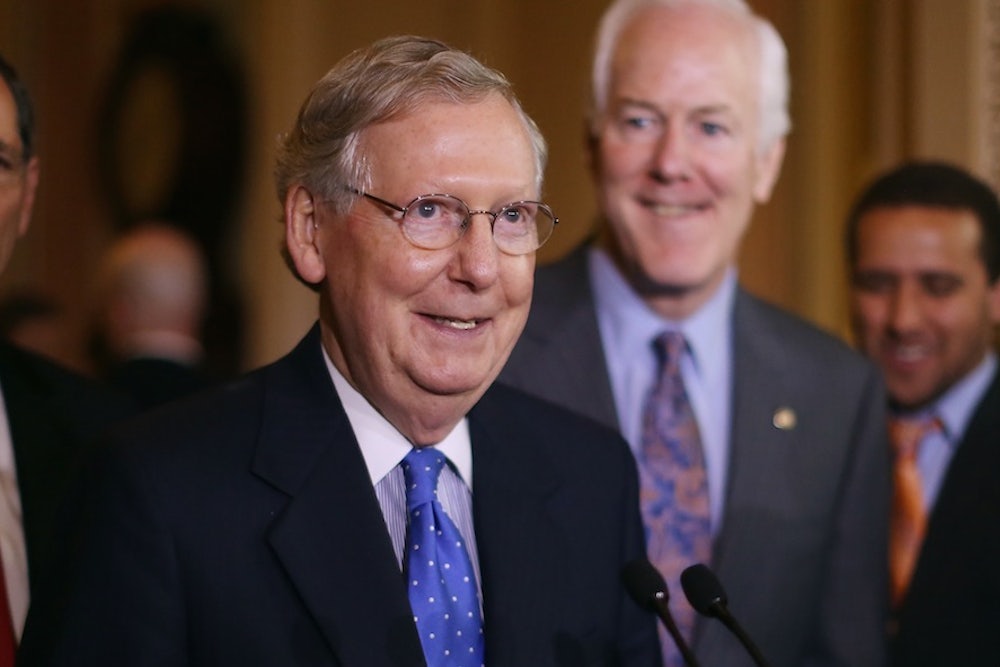Republicans in Congress are circling in on a legislative strategy to exploit Democratic misgivings over the Obama administration's proposal to significantly reduce U.S. greenhouse gas emissions—and to perhaps ultimately block the president from implementing it altogether.
But there's a huge catch. To cross the line between administering political punishment and actually winning the issue, they either need Obama's signature or veto-proof majorities to oppose the emissions limits, neither of which is in the offing. Thus, the only way they can really press their advantage is by fighting the rule within the context of some other non-optional process, and the most proximate venue is the appropriations process.
“I’m going to keep vigorously fighting against the Obama Administration’s continued War on Coal Jobs—and this extreme, anti-Middle Class national energy tax in particular,” Mitch McConnell said, previewing an amendment that would most likely stop the EPA proposal in its tracks, and thus draw a veto from President Obama if passed.
This naturally has a lot of people wondering if the Republicans might commit a calamitous unforced error and shut down the government on October 1, right before the midterm election.
What fun that would be! But I think history and reason both suggest they will not shut down the government before the election—but that their vehement interest in emitting as much carbon pollution as possible, combined with the likelihood that they'll win several Senate seats in November, presages a dramatic confrontation between Republicans Congress and the White House either right after the election or early next Congress.
The fact that Republicans shut down the government last October understandably colors the coverage and speculation surrounding the brewing fight over the regulations. It's the same cast of characters after all, which explains why reporters are asking about it, and why the White House is happy to feed the impression that these Republicans might just be that crazy.
But the crucial difference between last September and the coming one is that Republicans (particularly the hardline/opportunist faction) were staring down the imminent launch of the Affordable Care Act on October 1, 2013. After losing at the Supreme Court, and losing the 2012 election, and losing the first debt limit fight of 2013, the GOP really has no other venue in which to stage an apocalyptic fight over Obamacare. The shutdown part was optional and misguided, but they recognized that after October 1, the law would be too deeply rooted to repeal outright, which made a final showdown of some kind basically ineluctable.
The EPA rule is nothing like that. Or, at least, it isn't there yet. If Republicans cave now, or simply punt a confrontation over it until after the election, they'll have sacrificed nothing other than the opportunity to pants themselves in front of God and everyone a month before the election. And if they win a bunch of seats in November, their hands will be strengthened when they actually do go to the mattresses during this year's lame duck session of Congress or in early 2015.
There's abundant precedent for this basic approach. Four years ago, when Democrats controlled both the House and Senate, they didn't complete full-year appropriations before they got wiped out in the 2010 midterm elections. Instead, that September, they extended the existing budget into the lame duck session, under the assumption that they'd pass an omnibus spending bill before the end of the year. But having just creamed the majority, and laid claim to the House, Republicans were understandably in no mood to help Democrats fund the government on largely Democratic terms. So Senator Mitch McConnell killed the omnibus, and Congress punted all outstanding budget issues into the 112th Congress, into the realm of serial brinksmanship we've inhabited ever since.
If Republicans are determined to use similar tactics to either defund or de-authorize or tie down the EPA rules, there's no reason they can't wait to do it until after voters have already cast their ballots. Then they can demand it as ransom to avoid a shutdown or a default on the debt or whatever else they want, when the next election—the real prize—is two years away.
Assuming, of course, that they don't find some other way to blow it before November.
